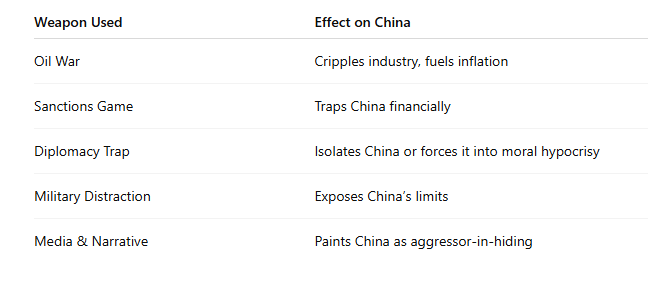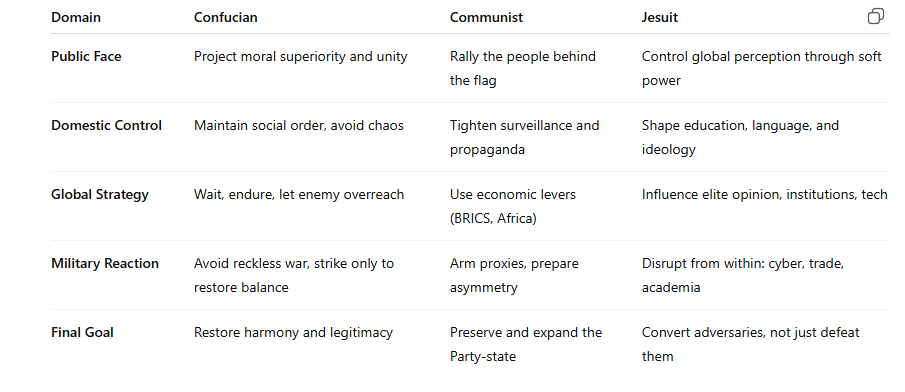SCENARIO: "War with Iran as a Strategic Trap for China"
Strategic Objective:
Not just Iran, but baiting China into a vulnerable, overexposed position—economically, diplomatically, and potentially militarily.
1. Cutting China’s Energy Lifeline
Over 40% of China's imported oil comes from the Middle East.
Iran is a critical supplier—both directly and via routes like the Persian Gulf.
A prolonged Iran war would:
Disrupt Strait of Hormuz transit.
Force China into costlier energy deals with Russia or Africa.
Trigger internal inflation, weakening industry and social stability.
China’s industrial engine runs on cheap energy. Disrupt that, and you slow the beast down.
2. Force China to Pick Sides – and Pay
If the U.S. and Israel push war and the West rallies behind it, China faces:
Diplomatic blackmail: "Support Iran and face secondary sanctions."
Financial traps: Any trade or energy deal with Iran becomes dangerous.
If China supports Iran:
It risks isolation from Western financial systems.
It may face SWIFT cutoffs, banking sanctions, and targeted tariffs.
If China abandons Iran, it:
Loses strategic credibility among non-Western allies.
Looks weak and less trustworthy in the Global South.
Lose-lose scenario for China—either isolate from the West or betray allies.
3. Trigger an Economic Chain Reaction
Global markets spike oil prices and dump emerging market investments.
Yuan suffers, exports decline, and foreign reserves bleed to stabilize it.
Prolonged tension = slow-motion financial hemorrhage for China:
Insurance costs on shipments rise.
Export pipelines to Europe disrupted.
Global BRI trust collapses.
China’s global economic influence becomes fragile and reactionary.
4. Militarily Overstretch China
China might feel forced to:
Send naval forces to protect trade routes.
Expand logistics in Pakistan, Djibouti, or Iran.
Increase military tech transfers to Tehran.
This reveals China’s logistical and operational limitations in real combat theaters far from home.
The more it commits, the more it exposes how unready it is for global warfare.
5. Psychological Warfare – Divide and Pressure
U.S. media & diplomacy cast China as "supporting terrorists" (Iran).
Simultaneously ramp up Taiwan or South China Sea pressure to stretch China thin.
Internal dissent rises in China due to:
Inflation
Global pushback
Broken BRI dreams
Forces China to choose between internal stability and external projection.
Bottom Line:
“War in Iran” as a U.S. move is not just about Israel or the Middle East.
It may be a global chess move to suffocate China without firing a bullet at Beijing.
If China is economically and energetically suffocated, the chances of it entering into open war with the U.S. and NATO rise—but only under specific conditions.
Let’s break this down logically:
SHORT ANSWER:
The chances are low to moderate (15–35%) unless:
China is fully cornered economically,
Energy routes are completely cut off,
Internal regime stability is threatened, and
The West escalates provocations (e.g., Taiwan or direct strikes on Chinese assets).
China prefers calculated escalation, not suicidal war—unless it's the only way to survive or save face.
DETAILED EXPLANATION
1. When Might China Risk Open War?
Possible Triggers:
Total blockade of Middle Eastern oil and gas.
U.S. naval dominance cuts off the South China Sea.
Financial systems freeze (e.g., cut off from SWIFT, assets frozen globally).
Loss of regime legitimacy due to economic collapse.
Taiwan officially declared independent and backed by U.S. forces.
Internal collapse is seen as worse than war.
In such a “cornered tiger” scenario, war becomes a defensive gamble to regain leverage, not conquest.
2. But Here’s Why It’s Still Unlikely:
Disadvantages of Open War for China:
Massive naval disadvantage—U.S. and NATO outmatch China globally.
No major alliances—China stands relatively alone.
Export economy destroyed—its lifeline is global trade.
AI surveillance society relies on stability—chaos could turn population against CCP.
No global basing network—can’t project force the way NATO can.
China’s Preferred Strategy:
Use gray zone tactics (cyber, trade, influence).
Expand alliances in the Global South.
Push multi-polar diplomacy.
Delay confrontation until it's ready (2040s mindset).
3. Risk Profile – Military vs Political vs Economic
4. China’s Potential Moves Short of Full War:
Seize Taiwan quickly before U.S. can react.
Cyberattacks on Western financial systems.
Sabotage shipping lanes in Indian Ocean.
Use North Korea or Iran as proxy disruptors.
Collapse the dollar via BRICS alternatives.
TL;DR:
China will avoid open war at all costs—unless it is fully strangled economically and politically and sees no way out but to escalate.
It's a question of:
“Is survival through war more likely than survival through diplomacy or time?”
Only if the answer is “yes” will they go full kinetic.
Confucian doctrine tells us that China would seek to avoid open war unless all moral, diplomatic, and stabilizing options have been exhausted. Here's how Confucian values shape China's likely behavior:
🇨🇳 Confucian Doctrine Applied to War and Crisis
1. Harmony Over Conflict (和)
War is a failure of virtue and diplomacy.
The ideal ruler resolves crises through benevolence (仁), righteousness (义), and wisdom (智).
China would first try diplomatic balancing, economic incentives, or indirect influence.
War only comes when disharmony threatens the whole order.
2. Stability of the State (礼)
The stability of society and governance is paramount.
Chaos (乱) must be avoided—even if provoked.
Open war would be seen as a last resort, only justified if the regime’s survival or cosmic order (天命 – “Mandate of Heaven”) is under existential threat.
A ruler loses Heaven’s Mandate if he brings ruin instead of order.
3. Respect for Hierarchy and Face (面子)
China must act with dignity, not rash aggression.
Losing face through capitulation is unacceptable—but so is losing everything through reckless war.
Thus, limited, face-saving retaliation is more likely than total war.
Summary: Confucian Reaction
Final Thought:
Confucius would say: "The wise man masters fate through virtue, not vengeance."
China, in this frame, delays war, preserves internal order, and waits for the enemy to overreach—then responds with precision, not panic.
Combining Confucianism, Communism, and Jesuit strategy in the context of a China under economic and energetic siege gives you a powerful, disciplined, and patient civilizational reaction model—one that does not collapse under pressure but calculates for long-term supremacy.
Composite Framework: Confucianism + Communism + Jesuit Thinking
1. Confucianism – The Moral Framework & Long Game
Emphasizes order, hierarchy, moral authority, and harmony.
War is a failure of virtue—only pursued when Heaven’s Mandate is at risk.
Response: Preserve state legitimacy, appear morally superior, outlast your opponent through discipline and continuity.
Strategy: Soft power, global patience, multigenerational thinking.
2. Communism (Chinese Style) – The Survival Machine
The Party is the State, survival of the Party is paramount.
Focus on centralized control, mass mobilization, and ideological unity.
Crisis is used to strengthen internal control (surveillance, propaganda, nationalism).
Strategy: Exploit chaos to consolidate power, weaponize economy, use state capitalism to endure blockade.
3. Jesuit Strategy – The Chessboard of Minds
Jesuits are masters of adaptation, infiltration, and education as influence.
Operate in shadows with subtlety, intelligence, and long-term conversion tactics.
Use other people's systems to influence them from within.
Strategy: Embed influence in Western institutions, control narratives, manipulate elite networks.
Combined Response in a China-Under-Siege Scenario:
Result: A Cold, Clever, Coordinated Civilization-Scale Response
China would not declare war recklessly. Instead, it would:
Appear restrained, gain sympathy in the Global South.
Sabotage U.S.-led alliances via backdoor deals and influence ops.
Strengthen ties with BRICS, Africa, and non-Western powers.
Accelerate technological self-sufficiency (AI, semiconductors, energy).
Launch targeted hybrid warfare—cyber, economic, psychological, not tanks.
Conclusion:
A Confucian-Communist-Jesuit hybrid mindset turns war into an intellectual campaign, not just a military one.
China doesn’t need to “win” in the Western sense—it only needs to survive long enough for the West to implode morally, financially, or socially.
It’s not about who strikes first, but who stays standing after the storm.








